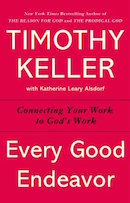Business Competition Can Be an Arms Race of Goodness
Blog / Produced by The High Calling
Let's start "an arms race of goodness." That's a proposal coming from FastCompany.com in their recent article Why Market Your Company with Stick-On Emotion When You Can Tap the Real Thing?
Marketers and businesses have always tried to attach their brand to some kind of emotional appear. Beer companies sell beer and sex. Axe deodorant sells deodorant and sex. FastCompany authors Dan and Chip Heath explain that even Downy the fabric softener sells fabric softener and a mother's love.
Then Dan and Chip make a modest proposal: "Why not simply replace the fake emotion with a real one? What if Downy started doing things to help struggling mothers -- and then used their ads to talk about the work?"
That's basically what David&Goliath did with the Weingart Homeless Project (see the video in the upper right of this post; hattip to Sam Van Eman for pointing me to David&Goliath in his fun post about snowglobes and marketing).
We've discussed this idea before at TheHighCalling.org and HighCallingBlogs.com. Last year, one of my favorite messages from Howard Butt was about Hair Dryers and Eternal Significance. A true story of how a real hair dryer company is giving back to society.
Reading that story again, though, I realized the power of FastCompany's suggestion. They don't qualify goodness with spiritual language or theological litmus tests or religious creeds. Unlike the stick figure in this cartoon, they don't spiritualize anything at all.
They keep it simple: Just do good. Love your neighbor as yourself. Love others by respecting them enough to share what you love. The golden rule means we are free to serve people out of our passions.
That's what National Instruments does. Dan and Chip explain it so well at FastCompany.com that I just have to quote them:
Austin-based National Instruments is an unlikely exhibit for the power of emotion. The company makes high-end scientific testing equipment used by particle physicists and biotech engineers. As you'd expect, NI's employees care deeply about science. So when NI's leaders considered how to give back to the community, they wanted to tap that passion. As described by the Stanford Social Innovation Review, NI set out to inspire more kids to fall in love with engineering and science. (The number of degrees awarded in these fields has been falling for years.) The company now sponsors robotics competitions for 9- to 18-year-olds, and it designed the software that powers Lego Mindstorms robotics kits. (You can't possibly hate science when you're building Lego robots.) NI employees also mentor STEM (science, technology, engineering, and math) students from local schools. This work is valuable for its own sake, of course, but it also boosts NI's brand credibility. When customers assess NI, they see a company obsessed with engineering -- to the point where, as a hobby, NI's employees volunteer at robotics competitions. Other scientific companies could try to make that point in an ad; NI lives it. Meaning it also pays off in an unexpected way: It motivates employees. When a company stands for something valuable, it makes workers happier. [Read the full article here.]It's practical. It's helpful. And it's valid game theory. The rising tide of goodness raises all the ships in the harbor. I know, I know, I'm dangerously close to some naive idealism that forgets the reality of competition and deceit and genuine human meanness. I'm expecting people like Bradley Moore and Glynn Young to push me back on this. But darn it, why can't we just do good anyway? Think about where you spend each day. Whether you're in an office or classroom or clinic or courtroom or home nursery, you need to invest in your community. (I'm talking to myself here too.) Investing in our community means something more than generic financial donations. Giving to charities and churches is important, but it isn't enough. What good will you do for your community? What is your passion? How can you share that passion with your community in a way that is not overly spiritualized, but humble and valuable to others?





